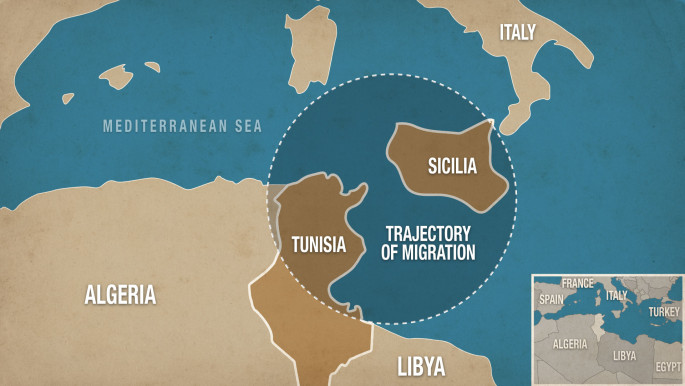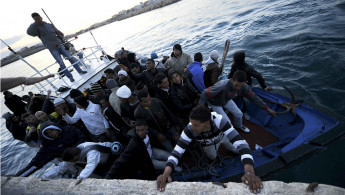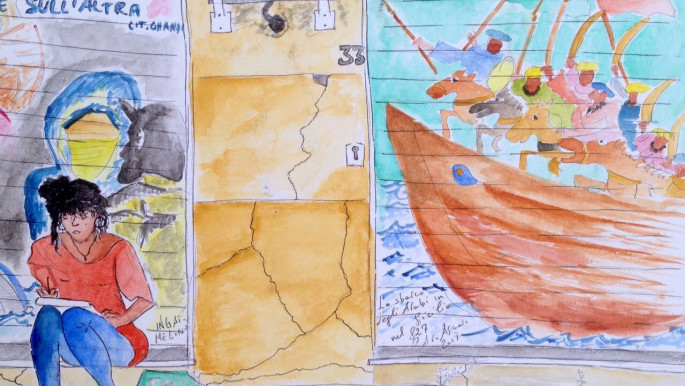Crossing from Tunisia to Italy: A tale in three parts
Just as many Italians travel to Northern Europe in search of better jobs today, many Tunisians used to travel to Italy, working for part of the year and returning home for the rest.
While the introduction of visa permits in the early 1990s did little to curb the flow of Tunisian migration to Italy, it did change the way in which people cross borders in search of a better life.
While three decades ago Tunisians could safely travel on passenger ferries, most of today's migration happens undetected through smuggling on fishing boats - with all the risks that this type of travel entails.
The following stories of two Tunisian men migrating from Tunisia to Italy will highlight the paradoxes, intricacies and differences between the migration of today and what happened years before visa permits were ever introduced.
Part 1: Mustafa's story
Irregular migration
Today, crossing the Mediterranean irregularly - that is, without a visa - is not the only peril that Tunisians face when deciding to travel to Italy.
Having an irregular status upon arrival makes the chance of regular employment nearly impossible. In Tunis, the capital of Tunisia, we met many young men who had experienced the dangers and dilemmas of this type of migration and life. Mustafa was one of them.
Always dressed in shorts, flip-flops and accompanied by an effortless smile that often folded into an easy laugh, we met Mustafa in a banlieue in the south of Tunis, where he frequented his local Qahweh (coffee shop). He appeared to know everybody who passed by.
As we sat and talked, sipping coffee amongst endless rounds of chain-smoked cigarettes, cars, scooters, bicycles and pedestrians would stop and handshakes would be exchanged along with the usual daily salutations and greetings.
"Salam, labess?", "Labess, Alhamdulillah" ('Hello, all is good?' 'All good, thanks be to God').
We mostly spoke in Italian. Like many other thirty-year-old men in Tunisia, Mustafa knew Italian perfectly. He knew it before ever setting foot in Italy, simply by watching Italian RAI 1 TV programmes - the first foreign channel to be transmitted on Tunisian television.
Always happy to chat away, Mustafa never told us his story in one go. Rather, he would hand us out pieces from a puzzle, mixed together with fragments and memories of other people.
Having migrated to Italy without a visa nearly ten years ago, his time there had never been easy.
He had lived nearly everywhere in the peninsula, moving often from one place to the next in search of work, finally settling down in 2009 to marry an Italian women in Perugia.
Deported back to Tunisia for a petty crime offence in 2010, he again made the journey in 2011, right after the revolution.
![Lampedusa fishermen mend their nets [Getty]](https://www.newarab.com/sites/default/files/styles/medium_16_9/public/media/images/E5E8E43F-1503-45DE-912C-E08E83D61684.jpg?h=d1cb525d&itok=A6kaqQKl) |
|
| Fishermen on the island of Lampedusa mend their nets near a detention centre for refugees [Getty] |
Despite months spent at the detention center in Lampedusa awaiting identification and potential expulsion, he was amongst the few Tunisians to be given a temporary six-month visa.
In 2015, Mustafa's second deportation happened when the Italian authorities found his visa had long since expired. It was at this point that he decided to try his chances in Tunisia.
Along with his wife, he established a business where she would drive a van full of second hand tat – juicers, dishwashers, jewellery, furniture - from Italy to Tunis. Mustafa would then sell these products at various markets in Tunis.
Mustafa proudly told us he had invented his own professional trade-routes to avoid wasting the rest of his 'best years' selling zatla (hashish) in the dark alleyways of Italian cities.
Very often others would drop in and join the conversation; Mustafa would act as translator with a number of people opening up about their stories while he was around.
One such participant was Wolid, a neighbour of Mustafa, who had spent 22 years in Italy working as a builder and electrician. In 2012, he was threatened with expulsion and, rather than wait months in Italian detention centres, he decided to return to Tunisia of his own accord.
"Italians call this 'voluntary' return", Mustafa would always point out.
Lofti and Mohamed, other frequenters of the Qahweh, had just been deported on a charter flight from Palermo, having spent less than three weeks in Italy.
"We were unlucky this time", they laughed.
Especially amongst the younger men in the community, Mustafa commanded a certain respect. Only later did we understand why.
 |
Especially amongst the younger men in the community, Mustafa commanded a certain respect. Only later did we understand why |  |
During his nearly ten years in Italy, Mustafa had built connections with an extensive network of Tunisians in different parts of the country.
Since his last return to Tunis, he had become renowned for advising youngsters who wanted to leave Tunisia about the risks and opportunities of the journey.
On a case by case basis, he would link them up with his contacts across Italy, providing future harraga (irregular migrants) with the necessary connections to find jobs, accommodation and protection on arrival - even if undocumented.
"Everyone wants a chance to make it to Europe", he would often remind us, speaking in a fast Italian dialect.
He spoke out of experience: "I'm no saint, but can you blame me? Can't you see how many young boys sit around here, doing nothing but chewing on cigarettes? Nobody wants to remain sitting here playing cards all their life."
Slowly but surely, the political and economic situation of the country is driving growing numbers of young unemployed Tunisians to try their luck by crossing the Mediterranean.
Mustafa, one who has tried his luck more than once already, is today the link between endless card games in a Tunisian suburb café and the many struggles and possibilities involved in crossing over to Europe, in search of a better life.
Part 2: Fira's story
Regular migration
We arrived in Mazara Del Vallo on the second day of Ramadan.
Pockmarked with architectural remnants of North African culture, this was the first Sicilian city to be conquered by the Arabs more than a century ago (827 AC.) - a detail that helps to explain Mazara's palpable Tunisian influence.
Mazara Del Vallo is a fishing city on the most south-western tip of Sicily, a few miles off the North African coast, today host to an estimated 10,000 Tunisians - the largest such community in Italy.
Unlike the stories of recent migration we heard from Mustafa and his friends in Tunis, the Tunisian community of Mazara Del Vallo travelled to Italy via regular routes in the 1980s, where they were legally employed in the city's fishing industry.
As the 2008 economic crisis left its mark on the Italian economy, both native and migrant workers are today facing rising unemployment rates and precarious working conditions.
For Tunisian fishermen working in Mazara, this raises the question of whether returning home is a more profitable solution than staying in Italy.
Here, the empty space was broken only by a lone curl of cigarette smoke spiralling from an ashtray.
Two men emerged from the shadows: one sitting, shaded from view; the other standing, dusting empty coffee cups that hung along the wooden panels lining the wall.
The second man's neatly combed pony-tail stood in contrast with the deep wrinkles that lined his face, the scars of sea-salt and sun.
His name was Firas, the owner of the cafe but a fisherman by trade from the Tunisian coastal region of Mahdia - where his family still remains.
After thick coffee was served and a new cigarette lit, Firas started to tell us - in a mixture of French, Italian and Arabic - how he'd arrived in Italy from Tunisia.
Back in the 'golden' 1980's, while young Sicilians were migrating to the richer and more industrial north of Italy in search of better prospects, Mazara's fishing ports called upon Tunisian fishermen.
"That's why they called us in - to come catch their red prawns."
Traces of nostalgia weaved their way between a smile, momentarily lightening the furrows of weariness that lined his face.
"It wasn't a bad deal… same job, same sea, more money."
Becoming more animated, he stepped further into his memory: "Red prawns were sold everywhere – 'kull el baled' ('every country')... We were the most important fishing port in the whole Mediterranean."
"Our prawns would be exported as far as Japan".
He paused to stub out a cigarette, gently allowing the mood to fall.
"It is more and more difficult to find jobs now. Fifteen years ago we used to be eight Tunisians out of ten crew members, as only the captain and the pilot would be Sicilian".
Today instead, the proportion has reversed as many young Italians in Mazara Del Vallo are in need of jobs and are often favoured by employers over Tunisians.
This is not the only issue at stake. The other man, Ahmed, who had been sitting silently in the shadow suddenly said: "The sea is also running out of fish."
![Sicily fish market [source: AFP]](https://www.newarab.com/sites/default/files/styles/medium_16_9/public/media/images/506951BB-4EBB-4172-84AC-5EC5DE81B694.jpg?h=d1cb525d&itok=tmUJFQn7) |
|
| A fish market in Sicily [Source: AFP] |
Together they explained how the effects of intensive trawling, combined with a lack of seasonal subsidies the Italian government used to provide, had led to a sharp decline in red prawns and other fish in the sea.
"There was no more work - that's why I opened this cafe."
Firas gestured around the empty café and added with a quick smile, "this used to be full, even during Ramadan."
Framed photographs of a packed smokey room adorned the walls around us as memories of a time gone by.
"But today no one can afford even a coffee."
In the ensuing silence, we asked Firas why he had decided to start a new business venture in Italy rather than return to his family in Mehdia.
Ahmed spoke up quietly: "We worked for more than 20 years for the Italian government, paying our taxes, contributions and everything, but I still don't have the certainty that I will receive my pension!"
 |
How can I return without knowing if I will have enough money to feed my family? |  |
He paused - "How can I return without knowing if I will have enough money to feed my family?"
Despite the ease with which Firas and Ahmed had travelled and found work in Italy, their immediate future is complicated by bureaucracy. Financial agreements on pensions and social provisions for Tunisians returning to Tunisia are unclear - pensions they should be legally entitled to.
Workers unions in both countries, still unable to challenge their respective governments on this issue, presently support returning Tunisian fishermen on a case-by-case basis. However, despite their best efforts, many workers are left unprotected.
Part 3: A better life?
The stories of these men illustrate the complex realities of people who cross borders, or attempt to, in pursuit of a better life. They also show the paradoxes and intricacies of today's ever more impenetrable borders.
On one hand, Firas, having experienced a time of more fluid migration, is today stuck in a Sicilian café with no clients, wanting to return to Tunisia but feeling unable to. He is worried that his return will deprive him of the final benefits linked to his expatriate life.
On the other hand, Mustafa was deported twice, and is unable to return to his wife in Italy legally. Despite this, he continues to support those who try to cross through irregular routes - the workers who are eventually recruited into the massive labour force of migrants that Italy, as with other EU countries, silently benefits from.
Written and illustrated by Roshan De Stone and David Suber. As part of Brush&Bow - a platform for creative journalism. Follow them on Twitter: @brushandbow2




